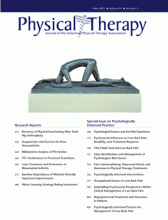Abstract
Evidence suggests that psychosocial factors have an influence on the outcome of physical therapy treatment and that the extent of their influence differs considerably among patients. As a consequence, substantial research efforts are focused on developing new clinical tools designed to identify and highlight when psychosocial factors are present at a level relevant to decision making. The conceptual differences in the ways that psychosocial factors influence outcome are described, structured around 3 common research terms: (1) prognostic factors, (2) treatment effect modifiers or moderators, and (3) treatment mediators. Prognostic factors are those characteristics that help estimate a patient's likely outcome irrespective of the chosen management. Treatment effect modifiers or moderators are factors measured at baseline that influence the relationship between a specific intervention and outcome. Treatment mediators are factors that have an intermediary role in the link between treatment and outcome. How these different influences on outcome can be translated into useful and complementary tools that aim to reduce treatment variability in clinical practice is described. One approach is to use prognostic factors to develop screening tools that identify an individual's risk status, typically based on predictive psychosocial factors such as catastophizing and depression. Another approach is to identify specific treatment effect modifiers to derive treatment decision aids or prediction rules to help match a patient's characteristics to the interventions available. A third approach is to use treatment mediators (eg, self-efficacy) to develop monitoring tools to inform the clinician about which aspects of treatment to strengthen.
Footnotes
Both authors provided concept/idea/project design and writing.
This work was funded by Arthritis Research UK.
- Received August 24, 2010.
- Accepted January 16, 2011.












